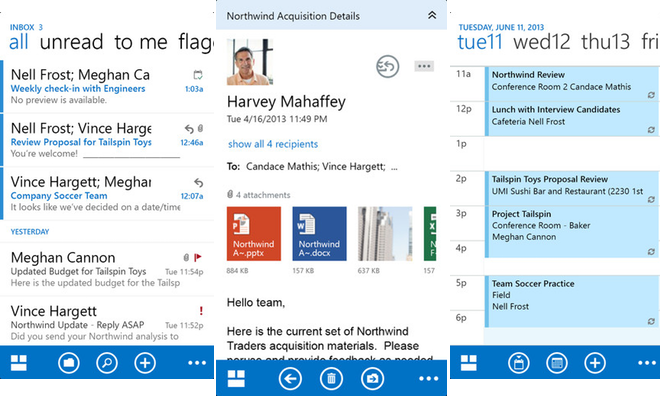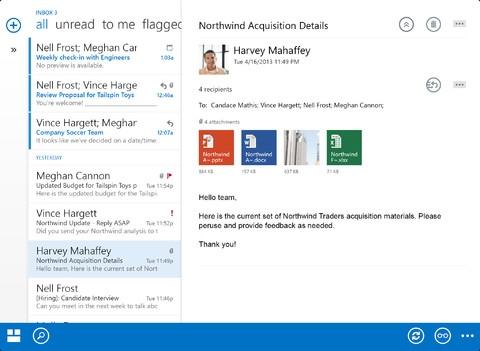Microsoft on Tuesday launched its official Outlook Web App mail applications on the iOS App Store, with separate downloads optimized for both Apple's iPhone and iPad.
OWA for iPhone and OWA for iPad are both available to download for free, providing users with a native Outlook Web App experience on iOS devices. In order to use the app, users must subscribe to Office 365 and have the latest update of Exchange Online.
AppleInsider was first to report last year that Microsoft was working on a native version of Outlook Web App for iOS. As expected, the new application uses the same tiled "Metro" interface found on Microsoft's other platforms, such as Windows 8 and Windows Phone.
Outlook Web App for iOS requires an iPhone 4, iPad 2 or newer running iOS 6 or higher. Using OWA on iOS does not incur an additional charge for Office 365 subscribers.
Features of the application, as highlighted by Microsoft, include:
- Organize your email quickly with Conversation View, Mark as Junk, Flag, and Categories
- Quickly search or browse email in all folders including Outlook Favorites
- Manage your schedule with ease
- Schedule meetings using attendee free/busy and room finder
- View shared calendars including delegate support
- Use your voice to look up a contact or bring up your schedule Keep business data secure
- Remote wipe erases only your corporate data in OWA for iPad and leaves your personal data on the device alone
- Separate passcode for OWA for iPad provides an additional layer of security
Both OWA for iPhone and OWA for iPad are 11.1-megabyte downloads.
 AppleInsider Staff
AppleInsider Staff









 Charles Martin
Charles Martin

 Malcolm Owen
Malcolm Owen
 William Gallagher
William Gallagher

 Christine McKee
Christine McKee
 Wesley Hilliard
Wesley Hilliard









42 Comments
Native Web Apps? WTH? Web Apps are not native, even if they are downloadable.
Sad thing for Microsoft is that nobody cares.
[quote name="cynic" url="/t/158509/microsoft-releases-native-outlook-web-apps-for-iphone-ipad#post_2362650"]Native Web Apps? WTH? Web Apps are not native, even if they are downloadable.[/quote] Well... Mail, Voice search/dictation, Maps, Web Browsers and such "native" apps rely on a web server component -- so the distinction is a little bit fuzzy. The first native iPhone app I wrote was an app that streamed Music Videos from a web server -- it was coded in Xcode, Installed on the iPhone, downloaded, then cached images and text descriptions of the Music Video files on startup. When the user selected a video, it would stream it from the web site... I would certainly consider it to be a "native" iPhone app.
I wonder if the NSA could do a spellcheck when they are going through your emails from this app. It would be rude if they graded it though.... "F for grammar? C'mon!"
If I have to pay, it's a fail.